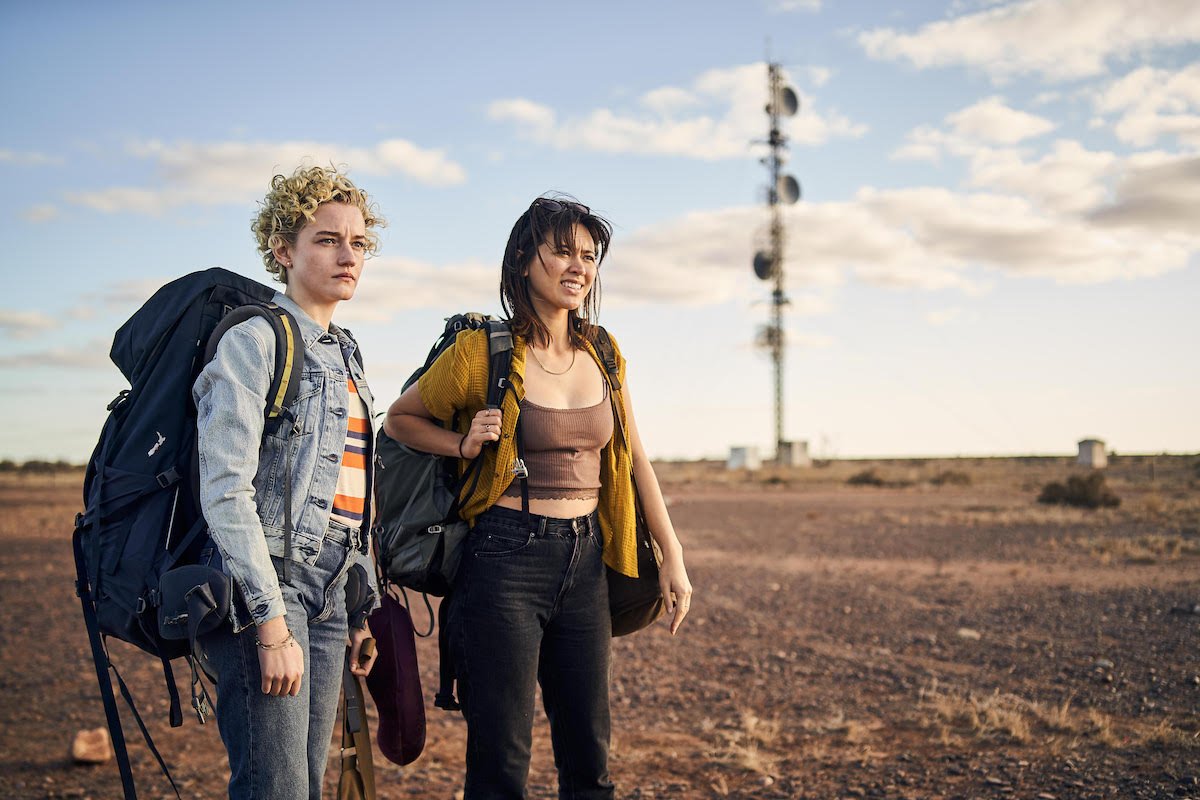MWFF Reviews: The Royal Hotel
By Hannah Torregosa
Combining Jed Palmer’s pulse-pounding compositions with classic Aussie bangers from the likes of Kylie Minogue and Men at Work, Kitty Green’s The Royal Hotel seeks and (for the most part) succeeds in producing a spine-shilling exploration of the darker underbelly of sexism and gendered violence that lies beneath Australia’s idyllic images of sunny beaches and laidback locals.
We open with a rave remix of Men at Work’s ‘Land Down Under’. The luxury party yacht coasts on glistening sunbathed waters under the iconic Sydney Harbour Bridge. Booze, boys and the briny. For young American tourists Hanna (Julia Garner) and Liv (Jessica Henwick), it’s the quintessential Australian holiday. But upon revealing that the pair are desperately in need of some cash, we swiftly cut away from this image and enter the cold stillness of a job agency office. Left with no other options, they take the only job available at last notice: barkeeping for The Royal Hotel, a Southern Australia outback pub in the heart of a mining town. The agency worker advises them that because of the nature of the location, they’ll have to be ‘okay with a little male attention’, a foreboding understatement in every right.
The film is a visual feast, with stunning shots of red earth, blue skies, waterfalls, and starry night skies, capturing Australia’s rural scenery in all its real and raw beauty. It is undeniably stunning, with a natural allure that initially draws in Hannah and Liv. The land itself is not malicious, but the men who occupy it are an entirely different story.
One of the first people the pair get to know is Matty (Toby Wallace), the charming and flirtatious local who takes a liking to Hannah. There’s also Teeth (James Frecheville), a comparatively sweet and sensitive ‘nice guy’ whose sole intention seems to be to take Liv out for a date and Dolly (Daniel Henshall), who is explicitly creepy from the outset. Green reveals a more sinister side to these archetypes and spotlights the complex duality of some of the characters that make them all the more dangerous. Teeth’s seemingly soft exterior hides an obsessively possessive disposition that charms Liv despite perhaps being one of the most volatile individuals who seems to unleash his anger by crashing his car. Matty initially charms the women by offering to take them on the scenic swimming trip they’ve been yearning for, ‘I mean, don’t you wanna get out and see the place?’. The tone of his scenes oscillates between romcom-esque and downright petrifying. From creepy jokes to soft touches of the hand to non-consequential pursuals. Until the film’s final climax, when he serenades Hanna from outside the pub’s door with a moonlit performance of Kylie Minogue’s ‘Tears in My Pillow’.
‘Tears on my pillow, pain in my hear
Caused by you
If we could start anew, I wouldn’t hesitate.’
But alas, it’s just a front to trick her into letting the terrifying team-up of him and Dolly into the pub.
Based on Pete Gleeson’s documentary Hotel Coolgardie, which follows two Finnish backpackers who similarly work at an isolated mining town’s only bar, The Royal Hotel is a psychological thriller that attempts to strike a delicate balance between portraying the all-too-real horrors women often face in a candid yet exhilaratingly entertaining manner. As to whether or not it succeeds, well, it’s a mixed bag.
Green provides a compelling depiction that invites audiences into the pair’s shoes in their tricky navigation of handling micro and macro aggressions, determining when to stand their ground or just let it go. For Hanna, there is a truly horrific performance to it all. Yet, perplexingly, Liv persistently excuses the men’s dangerous behaviour as ‘a cultural thing’, seemingly employing the ‘she’ll be right’ demeanour to almost every situation. This continues despite Hanna’s clearly verbalised concerns, only changing at the violent end when she sees her friend’s injured and bloodied face. Apart from her brief line, ‘We were supposed to get away from everything back home’, alluding to a desire for escapism, there is no other reference to the reasons for this. Indeed, there is a real lack of backstory or interiority given to either of the two mains. While this empty slate may encourage audiences to put themselves in their place, there is an emptiness to the characters that often left me bewildered about their actions beyond the use of driving the plot. Particularly in the case of Liv, as the film fails to afford her much nuance.
It’s quite a shame that in this film with such a pertinent and strong feminist message, the inner experiences of its female protagonists aren’t granted more importance. In the end, audiences are finally rewarded when the women unite to fight against their oppressors, with a somewhat cathartic, somewhat abrupt scene of the two setting the bar ablaze and a classic action film ‘unflinching walk away from explosion’ moment as the final image.
The Royal Hotel fails to deliver a comprehensive portrayal of gendered oppression that is firmly rooted in reality. Yet, it does offer a much-needed exploration of gendered violence in the Australian outback context that is unique, visually striking, and tensely fascinating.

